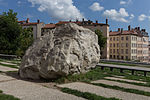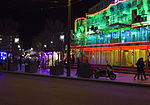Abbey of Île Barbe

The Abbey of Île Barbe was an Abbey built very early in the Christian era, on Île Barbe, outside of Lyon, France.The abbey was founded on the island in the 5th century and was the first monastic establishment in the Lyon region and one of the oldest in Gaul. Charlemagne endowed it with a beautiful library.The monastery, was however looted several times (in 676, and in 725 by the Saracens and in 937 by Hongrois). The abbey adopted the Rule of St. Benedict in the 9th century and gradually gained some wealth. In 816, Louis the Pious granted the monastery the right at any time of three ships on the Saone, the Rhone and the Doubs péages free of taxes; a decree of immunity and protection to monastère which was confirmed by Charles the Bald in 614. In the early 16th century, the abbey came under the commendatory of the family of Albon. In 1549, pope Paul III it is secularized and the monks became canons (collegiate). In 1562, she was devastated and burned by the Protestant troops of Baron Adrets. The chapter of canons was finally removed in 1741, and installs a facility for elderly or infirm priests, which in turn is removed in 1783. During the Revolution, at which point everything was sold and dispersed.
Excerpt from the Wikipedia article Abbey of Île Barbe (License: CC BY-SA 3.0, Authors, Images).Abbey of Île Barbe
Chemin du Bas Port, Lyon Saint-Rambert
Geographical coordinates (GPS) Address Nearby Places Show on map
Geographical coordinates (GPS)
| Latitude | Longitude |
|---|---|
| N 45.797 ° | E 4.832 ° |
Address
Chemin du Bas Port
69009 Lyon, Saint-Rambert
Auvergne-Rhône-Alpes, France
Open on Google Maps










